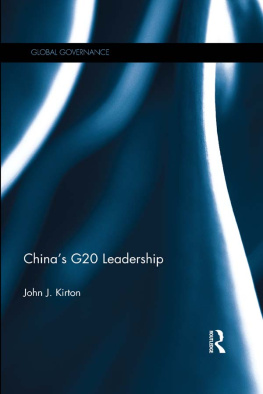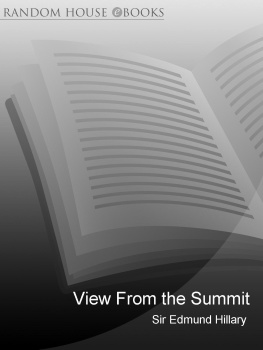STAYING TOGETHER
The G8 and Global Governance Series
Series Editor: John J. Kirton
The G8 and Global Governance Series explores the issues, the institutions, and the strategies of the participants in the G8 network of global governance, and other actors, processes, and challenges that shape global order in the twenty-first century. Many aspects of globalisation, once considered domestic, are now moving into the international arena, generating a need for broader and deeper international co-operation and demanding new centres of leadership to revitalise, reform, reinforce, and even replace the galaxy of multilateral institutions created in 1945. In response, the G8, composed of the world's major market democracies, including Russia and the European Union, is emerging as an effective source of global governance. The G8 and Global Governance Series focusses on the new issues at the centre of global governance, covering topics such as finance, investment, and trade, as well as transnational threats to human security and traditional and emerging political and security challenges. The series examines the often invisible network of G8, G7, and other institutions as they operate inside and outside established international systems to generate desired outcomes and create a new order. It analyses how individual G8 members and other international actors, including multinational firms, civil society organisations, and other international institutions, devise and implement strategies to achieve their preferred global order.
Also in the series
Guiding Global Order
Edited by John J. Kirton, Joseph P. Daniels and Andreas Freytag
ISBN 0754615022
New Directions in Global Economic Governance
Edited by John J. Kirton and George M. von Furstenbers
ISBN 0754616983
The New Transatlantic Agenda
Edited by Hall Gardner and Radoslava Stefanova
ISBN 0754617807
New Directions in Global Political Governance
Edited by John J. Kirton and Junichi Takase
ISBN 0754618331
Governing Global Trade
Theodore H. Cohn
ISBN 0754615936
The New Economic Diplomacy
Edited by Nicholas Bayne and Stephen Woolcock
ISBN 0 75461832 3 (Hbk) ISBN 07546 4318 2 (Pbk)
The G8, the United Nations, and Conflict Prevention
Edited by John J. Kirton and Radoslava N. Stefanova
ISBN 07546 0879 4
From Traditional to Group Hegemony
Alison Bailin
ISBN 0754619796
First published 2005 by Ashgate Publishing
Reissued 2018 by Routledge
2 Park Square, Milton Park, Abingdon, Oxon OX14 4RN
711 Third Avenue, New York, NY 10017, USA
Routledge is an imprint of the Taylor & Francis Group, an informa business
Nicholas Bayne 2005
Nicholas Bayne has asserted his right under the Copyright, Designs and Patents Act, 1988, to be identified as the author of this work.
All rights reserved. No part of this book may be reprinted or reproduced or utilised in any form or by any electronic, mechanical, or other means, now known or hereafter invented, including photocopying and recording, or in any information storage or retrieval system, without permission in writing from the publishers.
A Library of Congress record exists under LC control number: 2004028610
Notice:
Product or corporate names may be trademarks or registered trademarks, and are used only for identification and explanation without intent to infringe.
Publishers Note
The publisher has gone to great lengths to ensure the quality of this reprint but points out that some imperfections in the original copies may be apparent.
Disclaimer
The publisher has made every effort to trace copyright holders and welcomes correspondence from those they have been unable to contact.
ISBN 13: 978-0-815-39719-9 (hbk)
ISBN 13: 978-1-351-14860-3 (ebk)
This volume completes a trilogy of books on summitry. Volume I, Hanging Together, which I wrote with Professor Bob Putnam, first appeared in 1984. We produced German, Japanese and Italian versions over the next three years and an updated English edition in 1987. Volume II, Hanging In There, my sequel to the first book, was published in 2000. The two books together covered the whole cycle of G7 summits in the last quarter of the 20th century and the first appearance of the G8.
This new book covers the first sequence of G8 summits, from 1998 to 2004, in which every member country held the Presidency (except Russia, whose first turn comes in 2006). During this period the G8 fully absorbed its eighth member and re-invented itself to confront the new demands of the 21st century. The book tells the story of these summits and offers some judgements on them.
In the first two volumes I drew heavily on the knowledge of the summits I had gained as a member of the British Diplomatic Service. But after 1996, when I retired, that was no longer available to me. Instead, thanks to the good offices of the G8 Research Group of the University of Toronto, I was able to attend all the summits from 1997 onwards, apart from Cologne in 1999, with media accreditation. In 1997-1998 and again in 2002-2004 I represented LSE Magazine. During 2000 and 2001 I was part of the team sent by the Canadian Financial Post (later National Post ). Following the summits as a journalist gave me an entirely new perspective. Rather than getting the inside story from my complete knowledge of one country's position, I had to reconstruct it from the public statements and briefings of all the members, especially from the contradictions between them. All the narratives of the G8 summits in this book (except Cologne 1999) are derived from 'Impressions' written at the time and based on such briefings, supported by published G8 documents.
I owe a great debt to John Kirton, Director of the G8 Research Group, and to Madeline Koch, the Managing Director, for making me so welcome in the Group and especially for encouraging me to create this book. The writing of it brought back vividly the entertaining times and the lively discussions I had with them and other members of the Group at the summits over the years, especially Joe Daniels, Peter Hajnal, Paul Jacobelli, Ella Kokotsis, Marc Lalonde, Christine Lucyk, Victoria Panova, Gina Stephens, Shinichiro Uda, Heidi Ullrich, George von Furstenberg and Helen Walsh.
Before every summit, the G8 Research Group has organised, with a local partner institution, an academic conference in the country where the summit is being held. I have attended these conferences every year since 1997, in Denver, London, Bonn, Tokyo, Okinawa, Rome, Calgary, Fontainebleau (INSEAD) and Bloomington, Indiana. In 2005 the conference will be at Glasgow University. I have profited greatly from the guidance and encouragement of scholars I met there, as well as in other academic contexts. These include: Ted Cohn, Michele Fratianni, Olivier Giscard d'Estaing, Jeffrey Hart, the late Mike Hodges, Karl Kaiser, Seiichi Kondo, Richard Layard, Malcolm McLeod, Cesare Merlini, Sylvia Ostry, Bob Reinalda, Alan Rugman, Paolo Savona, Junichi Takase, Bertjan Verbeek and Bob Wolfe, together with three gifted Canadian diplomats David Angell, Len Edwards and Bob Fowler.
In London between summits, I have gained great benefit from the openness and expertise of my former colleagues in the Foreign and Commonwealth Office, especially Michael Arthur, Colin Budd, Creon Butler, Martin Donnelly, Graham Fry, Charles Hay, James Kariuki, Richard Lawrence and Joe McClintock. I have been encouraged by the continuing support of my colleagues at the LSE, especially Steve Woolcock, my partner in 'Economic Diplomacy', Chris Alden, Robert Falkner, Daphne Josselin, Razeen Sally, William Wallace, Andrew Walter and Judith Higgin, the Editor of LSE Magazine.











